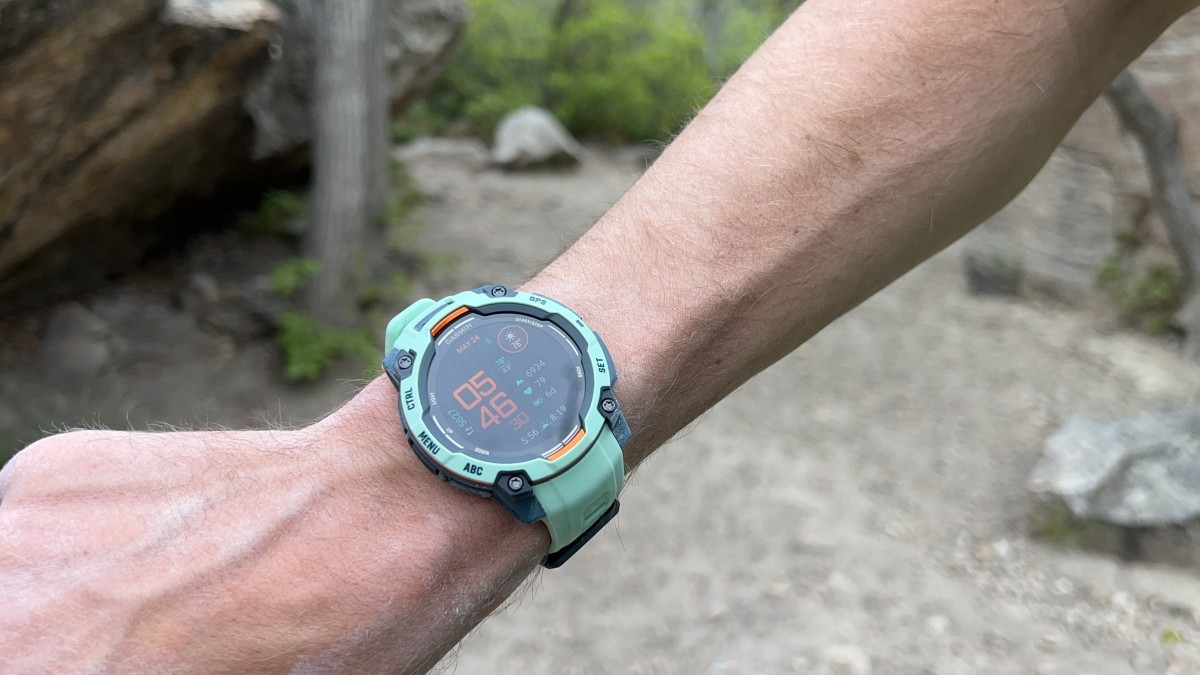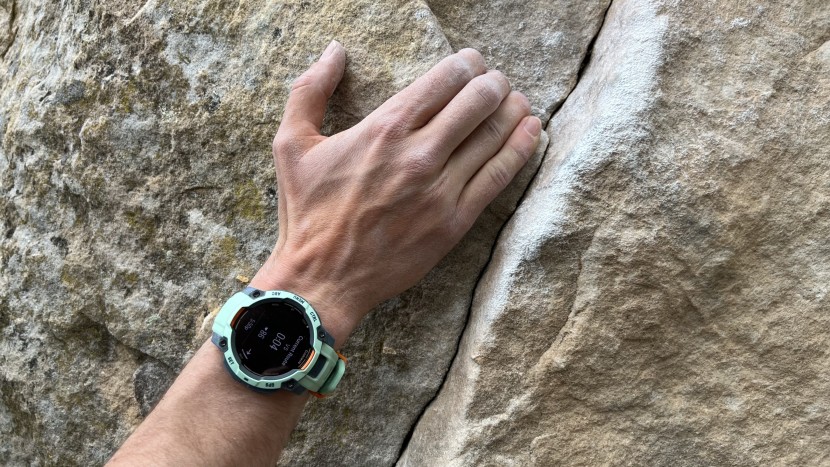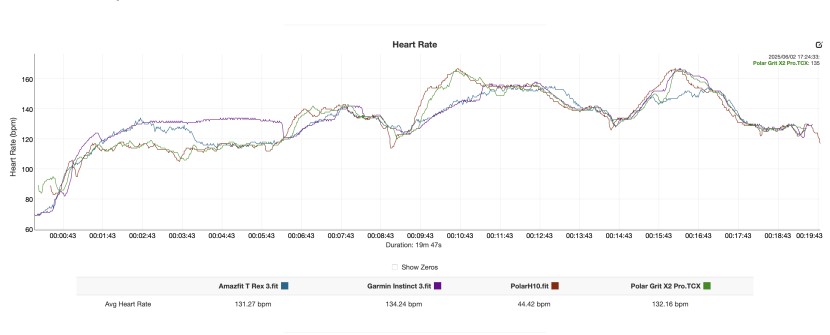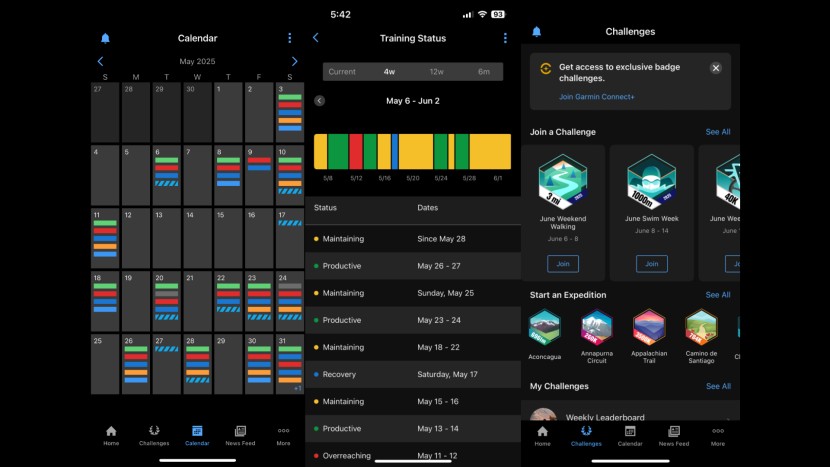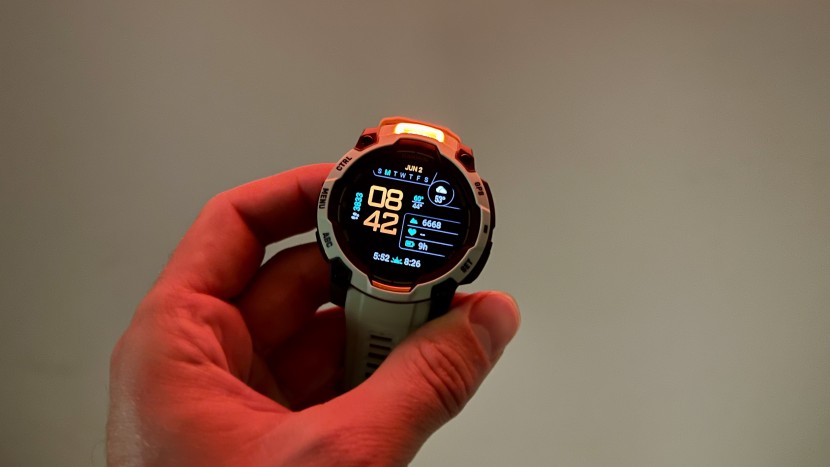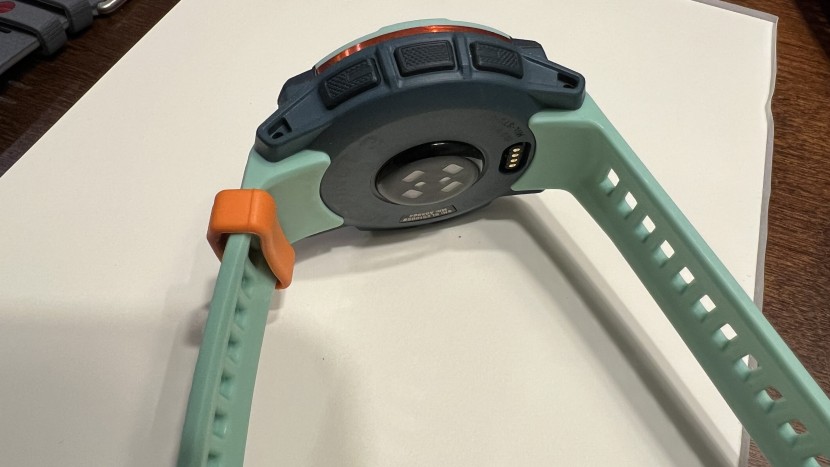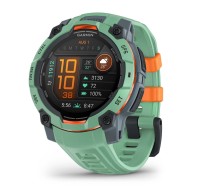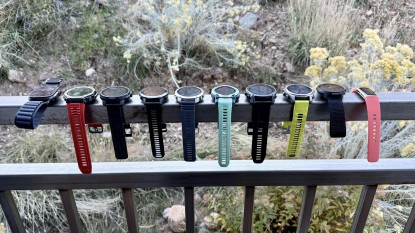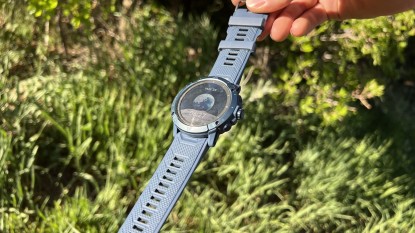
Our Verdict
Our Analysis and Test Results
If durability and aesthetics are your top priorities, the Garmin Instinct 3 is one of the most capable adventure watches available. It combines military-grade toughness with a vibrant AMOLED display. You get advanced sleep tracking and breadcrumb navigation with trackback and waypoint support. It's still missing topographic mapping and touchscreen controls, but that's part of its appeal — streamlined, durable, and built for harsh environments. The Instinct's bold, tactical styling won't suit everyone, but for those who value function over flash, it's an excellent choice.
Accuracy
To evaluate accuracy, we tested both GPS tracking and heart rate performance using a fixed 2.80-mile course and a reliable chest strap benchmark. Each watch was worn during the same route under consistent conditions, and the recorded GPS distance was compared to the known value. For heart rate, we wore the device alongside a Polar H10 chest strap and tracked data during a steady-state run with short bursts of effort. All watches were worn with a consistent fit and synced to align data for comparison.
During testing, the Garmin Instinct 3 recorded accurate GPS tracks that aligned closely with the known course, with minimal drift or signal loss. Heart rate data was more variable — especially at the beginning of workouts and during sudden intensity spikes. It typically lagged behind during bursts and took a couple of minutes to settle, averaging ± 3–6 BPM compared to the H10. While not precise enough for high-intensity training zones, it's reliable enough for casual fitness tracking and endurance efforts.
Activity Usage
The Instinct 3 AMOLED stands out in Garmin's lineup for blending rugged durability with a modern interface and crisp display. It doesn't overwhelm with complexity like some higher-end models, but the addition of the AMOLED screen and refreshed UI makes it much easier to interact with, especially when viewing multiple data fields or training metrics on the go. For climbers, paddlers, or anyone navigating technical terrain, the tough exterior and button-based controls make it a reliable tool in the field.
Thanks to its plastic construction, the watch stays lightweight despite its reinforced build, offering solid wrist comfort even during long sessions. The AMOLED screen is a welcome upgrade over the previous monochrome display, improving visibility in low light and at a glance during activity. One trade-off is a slight wake-up delay if not using the always-on mode. While it still lacks full topographic maps and touchscreen navigation, breadcrumb routing and trackback features remain effective for most outdoor navigation needs.
Though it doesn't push deep into advanced health analytics, the Instinct 3 supports a wide range of sport modes and performance tracking tools. For those who prioritize straightforward execution and durability over exhaustive data and mapping, this watch gets the job done. For a full breakdown of available metrics and modes, we suggest checking Garmin's official product page.
Its rugged design, simple controls, and focused feature set may especially suit those training in more physically demanding environments—whether that's high-intensity workouts, outdoor labor, or field-based professions. It's built to keep up without needing constant attention.
Everyday Use
Garmin has refined the user experience with the Instinct 3, combining the familiar five-button interface with a bright, modern AMOLED display that makes daily interaction smoother and easier to read. The menu system remains intuitive, and users can customize widgets and data screens either directly on the watch or through the Garmin Connect app. New to the Instinct 3 are several features not found on previous models, including more dynamic watch faces, support for Garmin's Morning Report (a daily summary of sleep, weather, and recovery), and a built-in LED flashlight.
Garmin Connect has also improved, with a cleaner layout and more streamlined daily summaries. The Instinct 3 builds on its predecessor's health tracking with the addition of HRV Status, offering deeper insight into recovery and long-term stress trends. Core wellness metrics like sleep tracking, steps, stress, and Body Battery remain reliable and accessible. While it lacks Garmin's most advanced performance analytics found on premium models, the Instinct 3 covers all the essentials for most users with a clean, efficient experience.
Extra Features
The Instinct 3 AMOLED stays true to its rugged roots, offering focused and practical tools designed for outdoor use. While it doesn't feature full topographic maps or turn-by-turn road navigation like Garmin's premium models, its navigation features are effective for trail users who prefer simplicity and reliability.
Environmental sensors like the altimeter, barometer, and compass (or ABCs) function well and provide real-time elevation, pressure trends, and directional heading, all helpful for mountain travel, weather awareness, and route planning. Additional widget tools include sunrise and sunset times, storm alerts.
This feature set is intentionally streamlined to avoid overcomplication. For users who prioritize rugged utility over flashy extras, the Instinct 3 offers a smart, field-ready balance that delivers on the essentials without excess. There are a few different models in the Instinct lineup, so make sure to check out the various product pages for the full spec lineup.
Notable Features:
- Breadcrumb navigation
- Waypoint marking
- Course creation & upload
- Altimeter, barometer, compass
- Sunrise/sunset data
- Storm alerts
- Solar charging (select models)
- Dual-position format (select models)
- Stealth mode & kill switch (tactical models)
For the full list of features, check Garmin's official specs page.
Wearability
The Instinct 3 keeps the same rugged, tactical design language the series is known for, but now adds subtle metal accents around the bezel that provide a cool visual contrast. The more modern, finished look may appeal to a wider audience without straying from its utility roots. We measured the case at 48 mm and 1.90 ounces, which feels substantial but not bulky, thanks to the balanced design and lightweight materials.
The five-button layout remains a highlight, offering dependable, tactile control in rough conditions where touch screens or scroll wheels fall short. Garmin's commitment to button-based input continues to make sense for activities like climbing, mountain biking, or cold-weather use with gloves.
Fit has also improved, thanks to added strap material beneath the hinge point that helps eliminate wrist gap — especially for smaller wrists. This small design tweak improves both comfort and stability without needing to crank the strap down tight. Mountain bikers and other high-motion users will appreciate how much more securely the watch stays in place on rough terrain.
The AMOLED display is a major visual upgrade, significantly improving visibility in low light and at a glance. That said, if battery life is your top concern, we recommend opting for the Solar version to take full advantage of Garmin's extended runtime capabilities. Users who want the watch face to stay consistent should also choose a non-AMOLED design.
Battery Life
With the switch to a bright, full-color AMOLED display, the Instinct 3 trades solar charging for visual clarity and a more modern user experience. While it no longer offers the virtually endless battery life that solar variants promised, overall endurance remains respectable. Garmin claims around 30 hours of battery life in standard GPS mode, which we were able to replicate in testing. This should easily cover most users' long efforts, such as all-day hikes, trail runs, or backcountry travel.
For day-to-day wear with Always-On Display enabled, we measured just under seven days of use, including daily health tracking, notifications, and intermittent GPS recording. Disabling the Always-On Display stretches battery life further for users who prefer a simpler screen experience. While this model doesn't cater to the never-charge crowd, it still performs well for those who want a rugged, color-screen watch without needing to plug in every night. Just keep charging needs in mind for longer expeditions, unless you opt for the MIP variant. That model sacrifices color and vibrancy but extends runtime significantly, making it a better choice for ultra athletes or those training across a wide range of disciplines.
Should You Buy the Garmin Instinct 3?
The Garmin Instinct 3 is a solid option for those who prioritize durability and simplicity over cutting-edge features. It retains the tough, utilitarian design of previous Instinct models, now paired with a bright AMOLED display and a more modern user interface. While it lacks Garmin's latest Elevate V5 heart rate sensor and doesn't support full topographic mapping, it still covers the basics well, offering a dedicated flashlight, breadcrumb navigation, and waypoint tracking. This isn't a watch trying to compete with the most feature-packed models, and that's by design. If you're drawn to the tactical, rugged aesthetic and want something dependable for active, outdoor, or military-style use, the Instinct 3 may be a good fit.
What Other GPS Watches Should You Consider?
Other rugged alternatives include the Garmin Enduro 3, Garmin Fenix 8 Solar, and the Suunto Vertical. These are excellent choices for expedition-level use, but they come at a significantly higher price than the Instinct 3. If you're looking for a more budget-friendly option, the Amazfit T-Rex 3 offers surprising durability and features for the cost. That said, if a long-standing reputation for reliability in tough environments is important to you, sticking with Garmin remains a safe bet.
| Awards | |
|---|---|
| Price | $450 List Check Price at Amazon |
Overall Score  |
|
| Star Rating | |
| Bottom Line | Rugged, reliable, and ready for adventure, delivering essential outdoor features with durability, making it a top pick for explorers |
| Pros | Dedicated flashlight, improved strap comfort, AMOLED screen, durable |
| Cons | No detailed mapping, less battery than other AMOLED models |
| Rating Categories | Garmin Instinct 3 |
| Accuracy (30%) | |
| Activity Use (20%) | |
| Everyday Use (15%) | |
| Extra Features (15%) | |
| Wearability (10%) | |
| Battery Life (10%) | |
| Specifications | Garmin Instinct 3 |
| Measured Body Diameter | 48.0 mm |
| Screen Type | AMOLED |
| Measured Thickness | 15.5 mm |
| Measured Battery Life with GPS | 31 hours |
| Sensors Included | Heart rate, altimeter, barometer, compass, temperature, blood oxygen level |
| Measured Charging Time | 120 min |
| Measured Screen Width | 30.0 mm |
| Measured Weight | 1.90 oz |
| Battery Life Claims by Manufacturer | Smartwatch: Up to 18 days (7 days always-on) Battery Saver Watch mode: Up to 24 days GPS Only: Up to 32 hours All Satellite Systems: Up to 25 hours All Satellite Systems + Multi-Band: Up to 23 hours Max Battery GPS: Up to 68 hours Expedition GPS: Up to 16 days |
| Navigation | Breadcrumb, back to start |
| Music Options | Control only |
| Touchless Payment | Yes |
| Sleep Tracking | Yes |
| Water Resistance (Max Depth) | 100 m |
| Main Software App | Garmin Connect |
| Compatible with Other Software Ecosystems | Yes |
| Watch Face Material | Chemically strengthened glass |
| Battery Type | Rechargable lithium ion |
| Bezel Material | Fiber-reinforced polymer/aluminum |
| Case Material | Fiber-reinforced polymer |
| Strap Material | Silicone |
| Tools Required to Change Band | Yes |
| Model Tested | AMOLED |
| Size Tested | One size only |
| Warranty Offered | 1 year |


